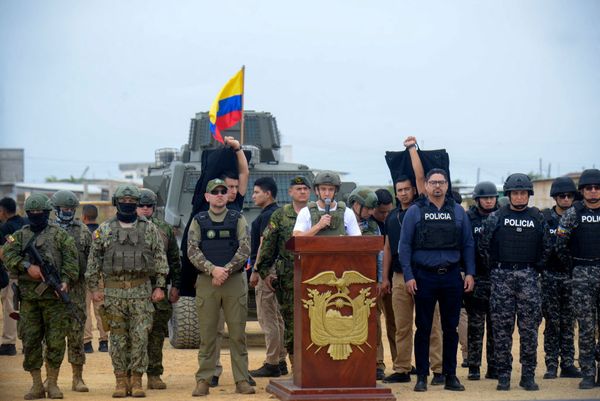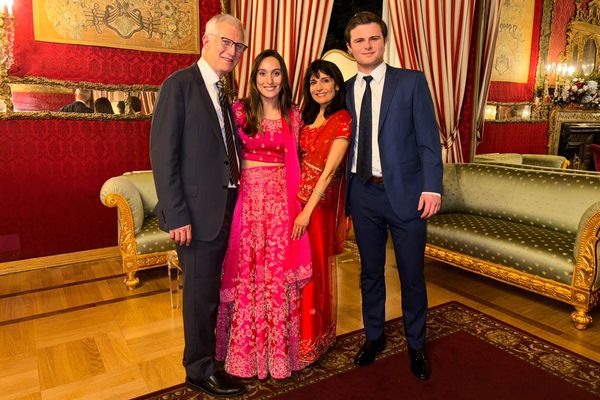
The startling contempt for Europe’s intensifying security concerns displayed by Donald Trump and his henchmen has brought an old, controversial question back to the fore: should Britain and France pool their nuclear weapons capabilities and create a Europe-wide defensive nuclear shield to deter Vladimir Putin’s Russia, if the US reduces or withdraws its support?
Trump has not so far explicitly threatened to cut US nuclear forces based in Europe. But speaking last week, the president said he wanted to halve the US’s defence spending, especially on nuclear weapons. Trump often denigrates Nato, keystone of European security. Last year, he encouraged Russia “to do whatever the hell they want” to member states that, in his view, spend too little on defence.
Pete Hegseth, the US defence secretary, warned Nato defence ministers in Brussels that defending Europe was no longer a strategic priority, and raised the prospect of US troop withdrawals. In an insulting speech at the Munich security conference, he minimised the threat posed by Russia. Americans would not be taken for “suckers” by Europeans, he said.
These unprecedented assaults on US-Europe ties have raised real fears of a damaging, possibly permanent rupture with Washington. It is against this volatile background that France’s president, Emmanuel Macron, has called an emergency summit in Paris of European leaders, including Keir Starmer. The meeting is expected to focus on Ukraine, its future defence, and Europe’s anticipated exclusion from US “peace talks” with Russia due later this week.
Yet an even bigger issue overshadows the summit: how to better organise Europe’s collective defences in the context of reduced, unreliable or nonexistent US support and overt nuclear threats from an emboldened Russia. Boris Pistorius, Germany’s defence minister, has predicted that Putin could attack at least one Nato country within the next five years. Frontline Poland and the Baltic republics voice similar fears.
Nato’s chief, Mark Rutte, has urged all 32 member states to expand defence spending. Many, including Britain, appear poised to do so. Volodymyr Zelenskyy, Ukraine’s president, dismayed by what looks to many in Kyiv like US betrayal, told the Munich conference it was time to create an “army of Europe”. That reflects ideas long promoted by Macron, a passionate champion of more integrated, expanded, self-reliant European defence – and reduced US dependence.
It is Macron who is leading the debate about a pan-European nuclear shield. The French leader gave new prominence to the idea in a 2020 speech at the École de Guerre in Paris, when he suggested a “strategic dialogue with our European partners … on the role played by France’s nuclear deterrence in our collective security”. Macron repeated the offer in 2022 and again last year.
France is not proposing to place its independent deterrent, the force de frappe, which comprises about 290 warheads and operates separately from Nato, under the control of other countries – or the EU. What Macron is saying, like François Hollande and other French leaders before him, is that there exists a “European dimension” to France’s nuclear defence planning. If, for example, Berlin were threatened with nuclear destruction, that would be seen as a threat to Paris, too.
“French leaders have three main worries,” an analysis published by the International Institute for Strategic Studies (IISS) stated. “Firstly, there is a high risk that Trump could withdraw from Nato, or at least significantly reduce US conventional forces in Europe … Secondly, he may also reduce the number of US nuclear weapons currently deployed in Europe, though not much evidence currently supports that prospect.
“Thirdly, and most importantly, a US president who loathes or dismisses many European countries is unlikely to risk American lives for Europe.” This latter argument has circulated in France since the days of Gen Charles de Gaulle, who created the force de frappe: namely that, if push came to shove, the US would go nuclear to save Boston but not Boulogne, Bratislava or Bognor Regis.
Macron’s proposal raises numerous, complex questions. Among them, who could order the actual use of “Europeanised” nuclear weapons? Who would pay for such a force, especially if necessarily modernised and enlarged? Would such a move make matters worse, by accelerating US disengagement?
The view from Germany, a necessary partner in any such project, is mixed. The chancellor, Olaf Scholz, and anti-nuclear parties such as the Greens strongly dislike the idea (as do French leftwing and far-right parties). But Friedrich Merz, Scholz’s likely successor, is reportedly interested. Manfred Weber, a leading German conservative, told the Guardian last year that doubts about Trump meant it was time to take up Macron’s offer. Weber also urged the opening of a “new chapter” with London.
The need for British involvement has also been raised by Christian Lindner, another senior German politician. “The question is: under what political and financial conditions would Paris and London be prepared to maintain or expand their own strategic capabilities for collective security?” Lindner wrote last year. “When it comes to peace and freedom in Europe, we must not shy away from these difficult questions.”
The IISS study raised similar issues. “As the only other nuclear power in Europe, Britain is a natural partner for France in any exploration of how to strengthen European deterrence … [They] regularly exchange data about nuclear safety and security … The British and French nuclear arsenals combined come to around 520 warheads, numerically equivalent to China’s current deterrent force. This alone could send a stronger message to Russia.”
Development of a joint UK-French nuclear umbrella, under the auspices of the European Nato allies and sidelining the US, is politically explosive for Starmer. It would raise questions about sovereign control, not least from the Eurosceptic right. It could be seen by many in Labour as fuelling nuclear weapons proliferation, bringing nuclear war closer. Putin, who has threatened to use nuclear weapons in Ukraine, would view it as a provocation. So, too, for different reasons, might Trump. It would be a good test of how independent of the US the UK deterrent really is.
But as the defence analyst Joseph de Weck argues in Internationale Politik Quarterly, times are changing fast. Governments urgently need solutions to Europe’s rapidly deepening security crisis. “Europeans may simply not have the time for gradualism in security integration any more,” De Weck wrote. Extending French and UK nuclear guarantees to the whole of Europe, including Ukraine, is an idea whose time has come.
Simon Tisdall is the Observer’s foreign affairs commentator







